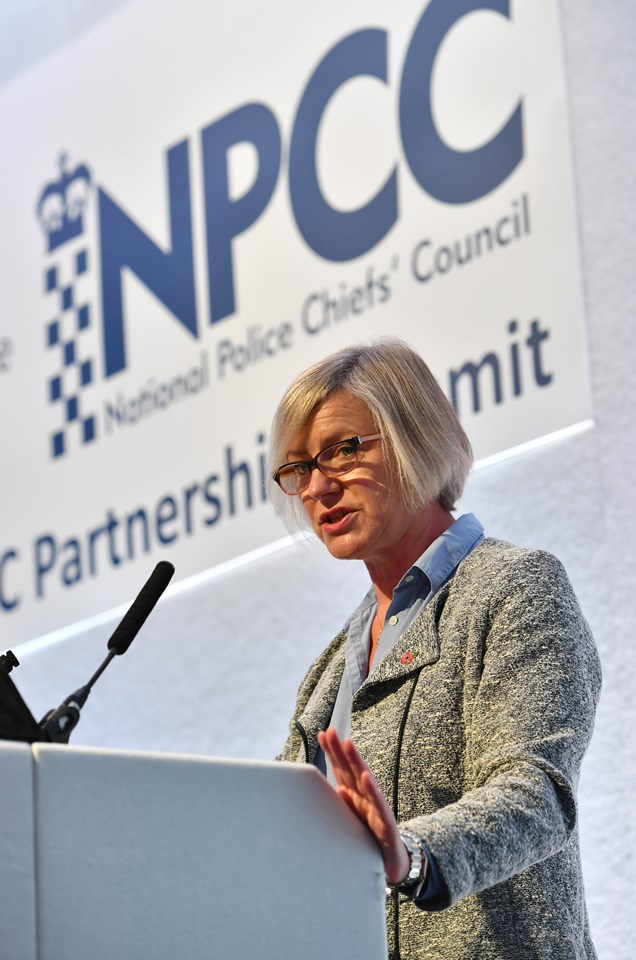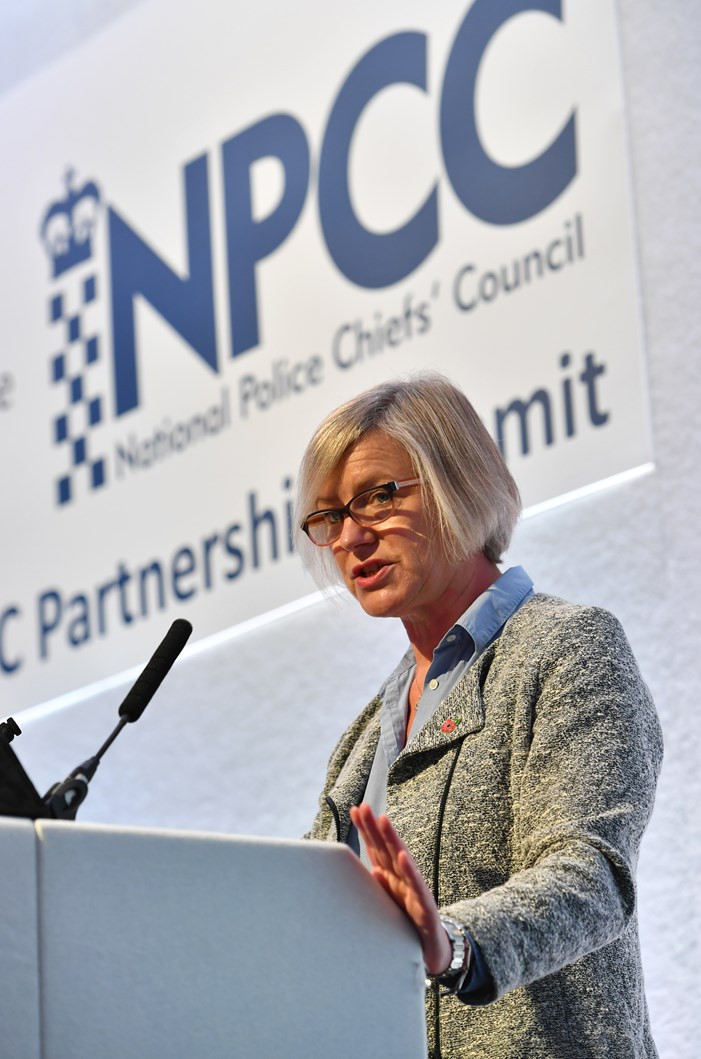
01 Nov 2017
NPCC Chair Sara Thornton speech to APCC & NPCC Joint Summit 2017 in full
I am delighted to be welcoming you to the third annual APCC/NPCC conference.
Police and Crime Commissioners and Chief Officers have important and different roles but we are all dedicated to making our communities safer and protecting the public. We work together at the local level, we are increasingly working together at the regional level and this conference demonstrates our cooperation at a national level.
2017 has been challenging – five terrorist attacks in six months and another tragic attack in New York last night which reminds us of the terrible threat of terror. Recorded crime is up by 13 per cent, record levels of 999 calls and growing non-crime demand to bridge gaps in local services. The police service is stretched - our staff are feeling it and the public is noticing it.
We have jointly raised this stretch with Home Office ministers and officials. It has become clear that the 2015 settlement of flat cash for forces is unsustainable. Forces are being asked to absorb pay rises and inflationary pressures and this is leading to cuts in service. We are particularly concerned that these cuts are undermining crime prevention and proactive police work.
I have been a chief constable for ten years and for all of that time the Crime Survey of England and Wales has shown reductions from its peak in 1995. And the crime survey is still showing a 9 per cent reduction this year if, and only if, we exclude 5 million online crimes.
We have grown used to crime falling. We may have been reassured by Steven Pinker's argument in 'The Better Angels of our Nature' - a book which Bill Gates described as his favourite of the last decade. Pinker argues that we are living in the most peaceful moment of our species existence – despite wars, terrorism and crime.
But recorded crime has increased by 13 per cent in the past year. And I think that most would agree that some of that is due to the requirement to record more lower level crimes such as harassment and assault without injury but there are also very worrying signs about the increase nationally in violent crime. Knife crime, gun crime and serious violence have all increased significantly.
Could this be the beginning of the end of the great crime decline? There is a currently fashionable view that sees history repeating its cycle of high, awakening, unravelling and crisis - and that we are currently in an ‘unravelling’ era with institutions in decline. Is that what we are seeing?
I don’t know that answer but I do not think that we can risk viewing the rise in recorded crime as a blip. In the way that experts say there has been a shift rather than a spike in the terrorist threat, I think that we are seeing a shift rather than a blip in crime.
The technology we all have to hand has made potential victims accessible and vulnerable to offenders from all over the world. For hundreds of years crime was committed in public places among people who knew each other. It still is, but is increasingly committed in private places and by offenders who have harmed their victims online but never known them personally.
The local is sometimes purely local but is often local and at the same time national or international connected digitally or to transnational organised crime or terrorism.
These challenges we face require more joint working. We are dealing with criminal networks, terrorist networks and digital networks. We need to develop even stronger law enforcement and policing networks in response.
Twelve months ago at this conference we launched Vision 2025 – our joint view on police reform. Since then we have developed a strong transformation programme which has developed new capabilities to tackle online child abuse and modern slavery, a transformational approach to forensic services, the opportunity to procure basic office services and digital platforms together and a commitment to share a range of specialist capabilities at a regional level. These initiatives will all help to tackle the crime challenges we face in 2017.
This is a time for grown up collaboration, for candid exchanges in a constructive spirit. We have embarked on considerable transformational change with our partners in the Home Office and the College of Policing.
I know that many of you are worried about the replacement of the current radio system by the Emergency Services Network. But we must not forget why we are doing this – although most chiefs were not in post and many PCCs were not elected when we started down this journey. The current system costs one million pounds a day and costs are going up not down as ageing infrastructure needs to be replaced. A replacement system is needed so that our officers and staff are properly equipped with an effective and modern communication system. We need to pull together on this significant challenge.
Similarly the plans the College of Policing has developed to professionalise the service can seem daunting and we are concerned about feasibility and affordability. Given all the stresses on the current system can we afford this? But can we not afford to invest in our greatest asset, our people and to develop a better understanding of what works in policing? So let us show leadership, debate the issues and ensure that we equip our people to be the best that they possibly can be.
So to this conference - we have put together a rich and varied programme which demonstrates the breadth of our policing mission, the scale of our innovation and the extent of our partnership working. The lightning talks were really popular last year and we have two sessions this year and still had to disappoint many applicants. We are, as ever, grateful to our sponsors and exhibitors and I would encourage you to visit their stands. And lastly we should never forget that the effectiveness of our policing relies on the skill, courage and dedication of all our officers and staff. We come together at this conference in support of all that they do, day in and day out. This evening at our conference dinner you will all have the opportunity to support the Police Arboretum Memorial Trust so that we can build a fitting memorial to honour the contribution of all officers and staff to the safety and protection of the public and to commemorate the sacrifice of the few who give their lives in the line of their duty.
Contact information
Communications office
By phone: 0800 538 5058
By email: press.office@npcc.police.uk

